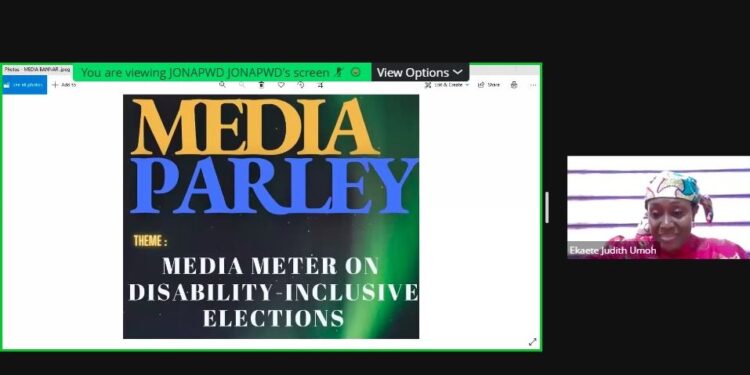Disability-inclusion experts have tasked media professionals to play an active role in ensuring evidence-based, accountable and disability-inclusive elections in Nigeria.
The call was made during the media parley on disability-inclusive elections organised by the Joint National Association of Persons with Disability (JONAPWD) in partnership with the policy and Legal Advocacy Centre (PLAC) with support from the Mac Arthur Foundation.
In her opening remark, Ekaete Judith Umoh, the outgoing National President of JONAPWD and Country Director of Christian Blind Mission (CBM) global Nigeria, premised her statement on the need to have an evidence-based lens to media reportage that will lead to the desired change concerning the participation of persons with disabilities in elections.
Ms Umoh said, “disability is no longer an afterthought. The paradigm has shifted so much that it is no longer about welfare, a human rights-based approach.
“If there is anything that needs to be unlearned, is that PWDs have an impairment and the impairment is not enough to bring about participation restriction.”
Lois Auta, the founder and Chief Executive Officer of Cedar Seed Foundation, stressed accountability and social inclusion demands for persons with disabilities in elections.
Mrs Auta said Article 29 of the UN Convention of the Rights of Person with Disabilities talks about the rights of PWDs to participate and be included in elections.
“Pre-electoral period, remove or reform outright barriers to voting and increase overall accessibility.
“There is a need to ensure inclusive election administration with a disability lens in all areas and also empower PWDs during the nomination process to viable candidates by being elected.”
“There is a need to assist the organisation of persons with disabilities in securing election pages from candidates and political parties to increase awareness of advocacy initiatives and constituents concerns.”
“Another action to take is to ensure that elections are inclusive is to make sure polling units are accessible to those on wheelchairs and those on crutches.
Speaking further, Auta asked that, “at our polling units today, can the visually impaired persons vote independently using brail ballot paper and for those that have hearing impaired, are there sign language interpreters at various polling units?”
These are very sensitive questions that we need to ask ourselves and hold the government accountable to achieve inclusive elections, she said.
Continuing after the election, the Cedar boss said, “we need to impose penalties when accessibility standards are not followed.”
“Review the process to capture lessons learnt and evaluate the impact of actions to increase access and inclusivity pre-election and during the election.
Other speakers at the session who called for disability inclusion in the electoral process were; By Dr Amina Salihu, Senior Program Officer, MacArthur Foundation and Mr Adamu Ishiyaku, President, Nigeria Association of the Blind.

